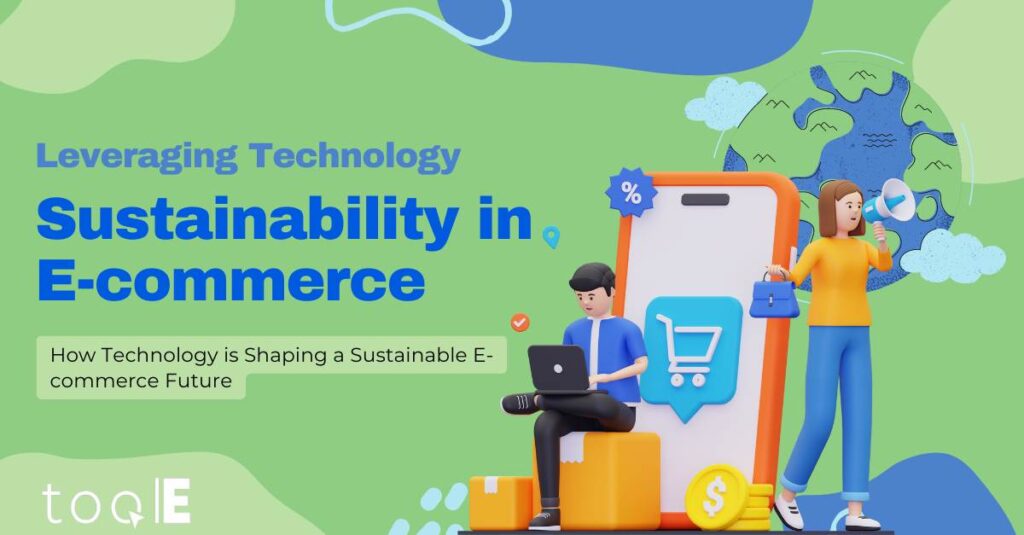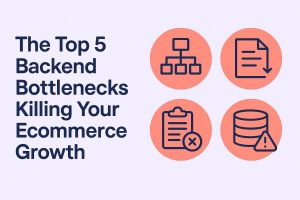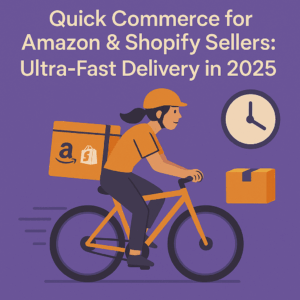In today’s fast-paced digital world, sustainability is no longer just a buzzword—it’s a necessity. As climate change and environmental issues increasingly dominate the global conversation, businesses, especially in e-commerce, must rethink their practices. Consumers are becoming more conscious of the ecological footprint of their purchasing decisions, and they expect the companies they engage with to follow suit.
E-commerce businesses, operating in a space known for high energy use and packaging waste, are uniquely positioned to benefit from sustainability initiatives. Integrating advanced technology offers a pathway not only to environmental responsibility but also to business efficiency and competitive advantage. Let’s explore how technology is shaping a more sustainable future for e-commerce.
How Technology is Shaping a Sustainable E-commerce Future
Technology has been a catalyst for change in every industry, and sustainability is no exception. For e-commerce businesses, advancements in technology provide the tools necessary to enhance sustainability at every level—supply chain management, operations, packaging, transportation, and customer engagement. Let’s dive deeper into the specific technologies that are helping e-commerce companies become more environmentally responsible.
1. AI and Machine Learning for Efficient Supply Chains
Artificial Intelligence (AI) and machine learning are transforming supply chain optimization by enabling data-driven decisions. They improve forecasting, inventory management, and logistics planning, helping e-commerce platforms reduce overproduction and waste. By analyzing sales data and trends, AI predicts demand accurately, preventing overordering and surplus stock that might end up in landfills, ensuring efficient resource use.
2. Blockchain for Transparency and Accountability
Blockchain technology, known for its role in cryptocurrency, is also being used to enhance transparency and sustainability in e-commerce supply chains. This distributed ledger system enables businesses to track the origin, journey, and impact of every product they sell. Blockchain provides clear and immutable records of how products are sourced, manufactured, and transported, making it easier for companies to identify inefficiencies and optimize processes.
Sustainable Packaging: Rethinking Waste
One of the most visible aspects of e-commerce is packaging, and it is here that sustainability can have a direct impact. Packaging waste, especially from single-use plastics, has long been a concern in online retail. However, technology is transforming this space too, allowing businesses to adopt smarter, more sustainable packaging solutions.
1. Biodegradable and Compostable Materials
Advancements in material science have made biodegradable and compostable packaging materials more widely available and cost-effective. These materials break down naturally in the environment, helping to reduce waste in landfills. By incorporating such solutions into their packaging, e-commerce businesses can drastically reduce their contribution to plastic pollution.
2. Smart Packaging Technologies
Innovative packaging technologies are reducing waste with “smart” packaging that uses minimal materials while ensuring product safety. 3D modeling allows companies to design precise packages, cutting down on excess filler like bubble wrap. Additionally, QR codes and NFC tags in packaging offer consumers recycling info and sustainability details, helping reduce waste while promoting eco-friendly practices.
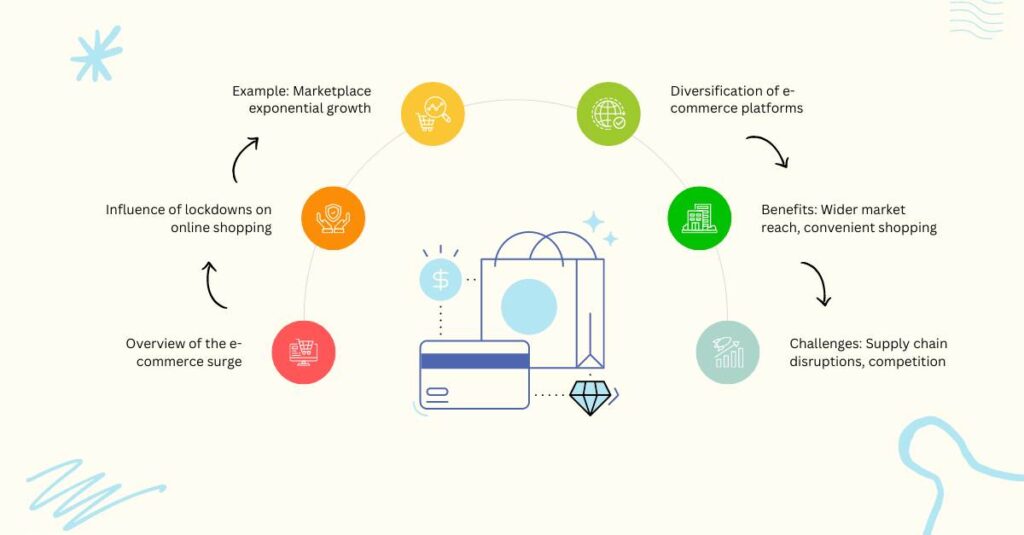
Leveraging Data Analytics for Sustainability
Data analytics offers another crucial avenue for promoting sustainability in e-commerce. Companies have access to massive amounts of data about their operations, customer behavior, and environmental impact, but the challenge lies in turning that data into actionable insights.
1. Resource Optimization
Through advanced analytics, businesses can track key performance indicators (KPIs) related to energy consumption, material use, and transportation emissions. By identifying inefficiencies, e-commerce businesses can streamline their processes, cut down on unnecessary resource use, and ensure that sustainability goals are met. This can lead to reductions in costs and environmental impact, creating a win-win for both the business and the planet.
2. Customer Behavior Insights
Data analytics tools can also provide valuable insights into customer preferences for sustainable products. With this information, businesses can tailor their product offerings and marketing strategies to cater to eco-conscious consumers, who are more likely to remain loyal to brands with strong sustainability commitments.
Amazon Easy Tool: Driving Efficiency and Sustainability
In the pursuit of efficiency and sustainability, one tool stands out: Amazon Easy Tool. This platform is designed to help e-commerce businesses optimize their Amazon storefront operations while reducing manual effort and resource use. For companies looking to improve their sustainability, Amazon Easy Tool offers several key advantages.
1. Streamlined Operations
Amazon Easy Tool automates time-consuming tasks such as inventory management, pricing, and customer communication. By reducing the need for manual intervention, businesses can minimize the energy and resources required to manage their operations, which contributes to lower overall carbon footprints.
2. Inventory Optimization
Overproduction and excess inventory can lead to significant environmental waste. Amazon Easy Tool’s smart inventory management system helps businesses keep track of stock levels in real-time, ensuring that they only produce and ship what is needed. This leads to less waste, reduced storage costs, and fewer emissions from unnecessary logistics.
3. Reduced Errors, Reduced Waste
By automating key processes, Amazon Easy Tool minimizes the chances of errors in order processing, inventory tracking, and fulfillment. Fewer errors mean less waste from returned or unsellable products, which contributes to overall sustainability goals.
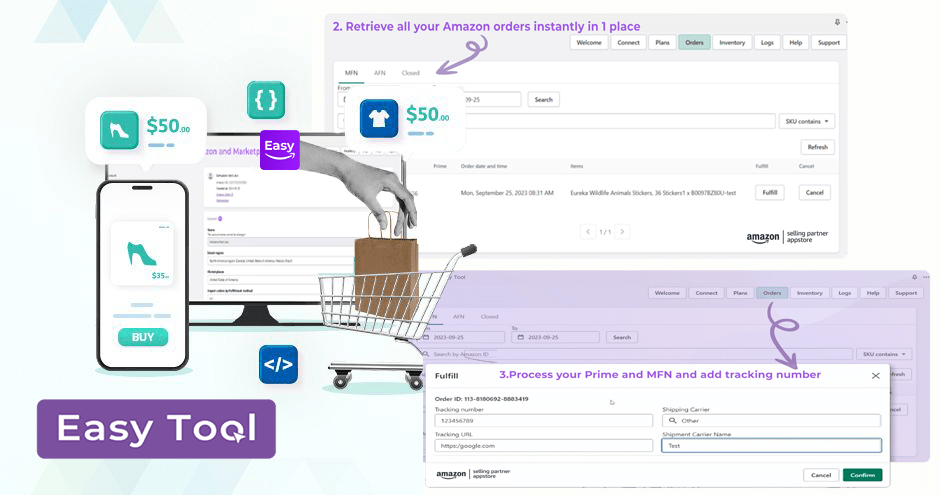
Conclusion: A Greener Future for E-commerce Through Technology
Sustainability and e-commerce no longer need to be at odds. With the help of advanced technologies like AI, blockchain, data analytics, and smart warehousing, businesses can create a more sustainable future while still maintaining profitability. Tools like Amazon Easy Tool make it easier for e-commerce companies to optimize their operations, reduce waste, and minimize their environmental impact.

